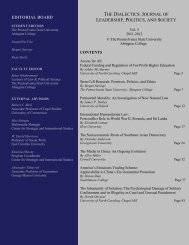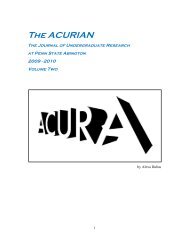Vol. III - Penn State Abington
Vol. III - Penn State Abington
Vol. III - Penn State Abington
You also want an ePaper? Increase the reach of your titles
YUMPU automatically turns print PDFs into web optimized ePapers that Google loves.
say, that if one set of expression is restricted it may limit a person’s desire to express oneself<br />
freely, as one is not aware whether his/her speech is included in the restricted category. Now<br />
considering the former, that is to say by making regulation on one form of expression acceptable,<br />
it may be easier than to regulate other expression.<br />
Further, it is not evident which expression has no value in the search for good public<br />
policy or truth. The mere fact that hate speech exist shows this. While great majorities do not<br />
believe in the content of the hate speech, to regulate it would block a minority view from the<br />
market, resulting in a market crash brought about by the exclusion of all available ideas.<br />
Alternatively, even when there appears to be a clear consensus, opinion on the subject may<br />
change over time. As Justice William Douglas put it, expression should not be regulated because,<br />
“the audience that hissed yesterday may applaud today, even for the same performance”<br />
(Kingsley v. Brown, 1957).<br />
Lastly, it is easy to confront expression that undermines public debate. Again, consider<br />
the example of hate speech: if a person is ranting and raving about how one race is inferior to<br />
another, that speech does not need to be regulated, but answered. That is to say, one should<br />
follow the classic maxim, that bad speech ought not to be regulated but answered with good<br />
speech.<br />
A second theory that supports the view that a robust concept of free expression is good<br />
for society is the expressivist theory. The expressivist theory “emphasizes freedom of<br />
[expression] as an independent value rather than a means to an externally realized good”<br />
(Nelson, 2005:62). That is to say that free expression is a good in itself rather than as a means to<br />
another good. Many scholars believe that when others express themselves as an end to itself, the<br />
expression promotes and produces self-realization (Nelson, 2005). Having an open and robust<br />
arena of expression forces one to take responsibility for the expression. Society is so diverse that<br />
there will often be someone else with opposing viewpoints. This challenge may lead to the<br />
reinforcement of one’s original expression or it may force one to rethink the original expression.<br />
Again, we can consider the example of hate speech. One person enjoys partaking in hate speech<br />
and thinks that his ideas are completely justified, while another person disapproves of hate<br />
speech and thinks that the ideas are completely unjustifiable. The second person is likely to<br />
challenge the first person and at the end of the exchange, the first person is unable to justify his<br />
ideas. As a result, person one will rethink his ideas on hate speech and, ideally, develop into a<br />
greater person because of it, while the second person will have his ideas reaffirmed and realize<br />
that his ideas are reaffirmed. This theory is not only good for the individuals benefiting from<br />
self-realization, but also society, as the society can run more effectively if all individuals are<br />
given the opportunity to realize their potential and develop solid ideas backed by reason and<br />
logic.<br />
The main problem with the expressivist theory is that it is has been poorly defined<br />
(Nelson, 2005:68). For example, one can consider Rodney Smolla’s definition, “[freedom of<br />
expression is] a right defiantly, robustly, and irreverently to [express] one’s mind just because it<br />
is one’s mind…freedom to [express] without restrain provide the speaker with an inner<br />
satisfaction and realization of self-identity essential to individual fulfillment” (Nelson, 2005:68).<br />
The problem is that Smolla’s definition focuses too much on individual fulfillment, without<br />
mentioning the benefits to society as a whole. Individual fulfillment on its own is not enough of a<br />
justification. As Nelson notes, “if one’s mind is to express racial hatred in the form of racist<br />
epithets, it is not at all self-evident that the speaker’s inner satisfaction and self-identity should<br />
THE DIALECTICS ▲ 2009<br />
www.abington.psu.edu/dialectics<br />
52







